If you research bed bug insecticides, you may feel overwhelmed with the variety of different products on the market. But what chemicals kill bed bugs most effectively, and what exactly do these chemicals do?
In this article, we’ll explore the 7 types of chemicals approved for use against bed bugs. We’ll go into detail with how they work as well as the pros and cons of each chemical class.
Here are the 7 best chemicals to kill bed bugs:
Pyrethrins
Pyrethrins are insecticides derived from chrysanthemum flowers. It’s one of the most common chemicals used to drive bed bugs away from an area.
But because of its frequent use, some bed bugs are resistant to this chemical and may only leave an area temporarily.
Pyrethroids
Pyrethroids are synthetically-derived chemical insecticides that mimic pyrethrins. Like pyrethrins, pyrethroids are commonly used to get rid of bed bugs, but there are some bed bugs that are resistant to this type of chemical as well.
In these cases, products that combine multiple classes of chemicals can prove to be effective when bed bugs appear to be resistant to pyrethroids and/or pyrethroids.
Desiccants
Desiccants permanently damage and strip away the bed bugs’ waxy outer coating on their bodies. This exposure causes the bugs to dehydrate and die slowly.
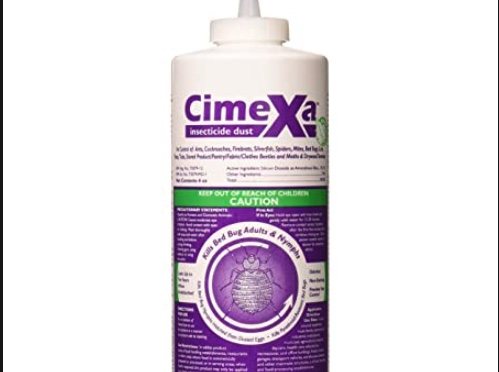
This physical and irreversible damage is effective against bed bugs. It’s impossible for bed bugs to become resistant to desiccants because of the physical nature of the product.
The two most common desiccants used to combat bed bugs are diatomaceous earth and boric acid. Desiccants should be used in cracks and crevices only, not spread across surfaces, to minimize human inhalation of the desiccant powder.
But desiccants work slower than insecticides, as their method is physical instead of chemical. Therefore bed bugs need to crawl over/around the treated area, in order for the chemical to be deadly.
So while bed bugs can’t develop resistance to desiccants, this compound won’t work if bed bugs don’t make physical contact. For that reason, desiccants aren’t the single best method and should be used in combination with other chemical methods.
Biochemicals
There is only one biochemical pesticide officially registered for use against bed bugs: cold-pressed neem oil. Derived from the Neem tree, neem oil contains insecticidal compounds and has been proven effective against bed bugs at all life stages.
But neem oil will lose its potency after about a week. It’s more likely that neem oil will simply repel bed bugs away from the sprayed area rather than kill them entirely.
It’s best when used in combination with other more effective methods.
Pyrroles
Chlorfenapyr is the only insecticidal chemical registered to be effective against bed bugs. This chemical disrupts bed bugs at the cellular level and wreaks havoc.
Pyrroles only become lethal after entering the insect’s body. Once metabolized, pyrroles disrupt the bed bug’s ability to transfer energy between cells, thus killing it from the inside out.
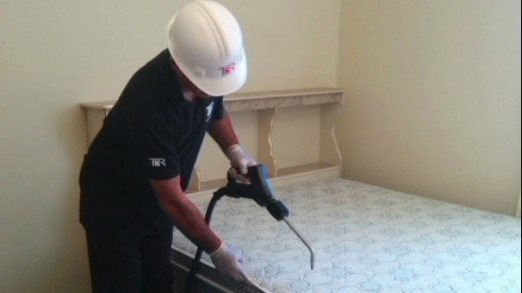
Because pyrroles are not lethal to bed bugs upon contact, they should be used in combination with other insecticidal methods. Pyrroles take time to work, as this chemical class must enter the bug’s metabolism before it becomes deadly.
Neonicotinoids
Derived from nicotine, neonicotinoids cause bed bugs’ nicotinic receptors to fire until they fail. This makes neonicotinoids a unique kind of pest control because they attack the bed bugs’ nervous system.
This class of chemicals is a good alternative if your bed bugs are resistant to pyrethrins and pyrethroids.
Insect Growth Regulators
These chemicals alter the juvenile growth hormones in insects. As a result, the growth process is either sped up very quickly or stops development completely. Both alterations will damage and kill the insect.
Insect growth regulators can also disrupt bed bugs’ production of chitin, the compound that makes their external shells.
What Chemicals Do Exterminators Use For Bed Bugs
The Environmental Protection Agency (EPA) in the United States has over 300 products registered to combat bed bug control.
While there are many products on the market, including bed bug sprays, all will have one of the above-mentioned seven chemical types as its active ingredient.
For most infestations, exterminators will use the same kinds of products you see in stores. In many cases, professionals will combine multiple different kinds of chemicals and product types to ensure the infestation is adequately treated.
Resistance: Add Synergists
When bed bugs become resistant to certain chemicals, a synergist such as piperoynl butoxide may be used.
Resistance in bed bugs has been linked to their ability to undergo metabolic detoxification. This means that over time, bed bugs have adapted to these chemicals and are sometimes able to break them down in their bodies without killing them.
Synergists disrupt bed bugs’ metabolisms, thus inhibiting their ability to resist most chemicals.
Method: Fumigation
When professional exterminators believe an infestation is bad enough, fumigation is required. In this instance, the room, apartment or house must be fully vacated during and after the process.
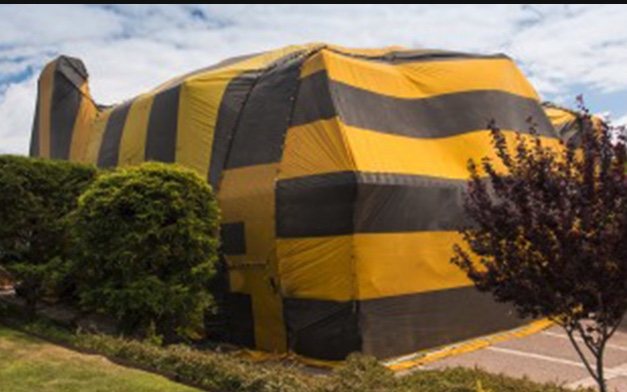
The chemicals used for fumigation are harmful to humans and pets, so any food or consumables must also be removed from the property in order to ensure no one will be poisoned by accident.
Professional methods can be costly depending on the size of the home and the severity of the infestation. Therefore you should research the cost to get rid of bed bugs before committing to an exterminator.
What Do Bed Bugs Hate?
Bed bugs can be deterred or even killed by harsh chemicals, extreme temperatures, a clean/open room, or lack of food.
Let’s go through these in greater detail.
1. Chemicals That Disrupt Bodily Functions
All of the chemicals mentioned above affect bed bugs in different ways. Some damage their shells, some disrupt their metabolisms and some damage their nervous systems.
Whichever way you cut it, bed bugs do not like chemicals that inhibit their ability to grow and reproduce.
2. Extreme Heat
Bed bugs hate can’t stand hotter temperatures. An environment of 125 degrees Fahrenheit or warmer will kill bed bugs in all life stages.
3. Extreme Cold
Bed bugs can’t thrive in colder environments. When the temperature of their environment goes below 50 degrees Fahrenheit, it’s more difficult for them to eat and reproduce.

When the temperature goes below 0 degrees Fahrenheit, bed bugs will die if exposure is long enough.
4. Extreme Minimalism/Cleanliness
If an environment is very clean and free of debris and furniture, bed bugs will have nowhere to hide.
Bed bugs will most commonly live and reproduce in fabric-based furniture such as beds, couches and armchairs, so if those are removed from an affected home, these insects will have nowhere to reside and repopulate.
This will make it easier for you or a pest control professional to locate the bed bugs and exterminate them.
5. Lack of Oxygen
While they are tiny insects, bed bugs do require some oxygen in order to survive. Trapping bed bugs in vacuum-sealed plastic is a great method to suffocate bed bugs, though it may take some time for them to run out of oxygen once trapped inside.
6. Lack of Food
Bed bugs require animal blood to survive. If they do not have a host to feed off of, they will eventually perish. Usually, this happens within 2-3 months after their last meal.
Isolate bed bugs and deprive them of access to any human or animal, and they will surely die within a few months.
So Which Chemical Kills Bed Bugs the Best?
While some chemicals are more effective than others, there is no “one size fits all” method for bed bug extermination. For example, some chemical products kill bed bugs instantly, whereas others last longer, but cause a slower death.
To ensure you’re using the right mix of chemicals, you should consult with a professional.
Below is a few tips to keep in mind:
- Consulting an exterminator is the best method, and their professional opinion will determine which chemical is best for your case of bed bugs.
- Many exterminators use pyrethroids and pyrethrins, but neonicotinoids are also popular and are the most widely-used type of insecticide in the world.
- Professional fumigation or chemical methods will show more immediate results. Gaseous fumes are harder for insects to avoid. Their exposure to the chemicals will kill them faster than any other method.
- It’s likely that your exterminator will recommend using insect growth regulators in tandem with a fumigation or chemical treatment.
There’s no single best answer to what chemical kills bed bugs best, as it depends on the severity of the infestation and whether the bed bugs you have are resistant to any of the aforementioned chemicals.
All the chemicals and compounds mentioned in this article have been proven to kill or repel bed bugs effectively, but you’ll need to consider each infestation on a case-by-case basis.
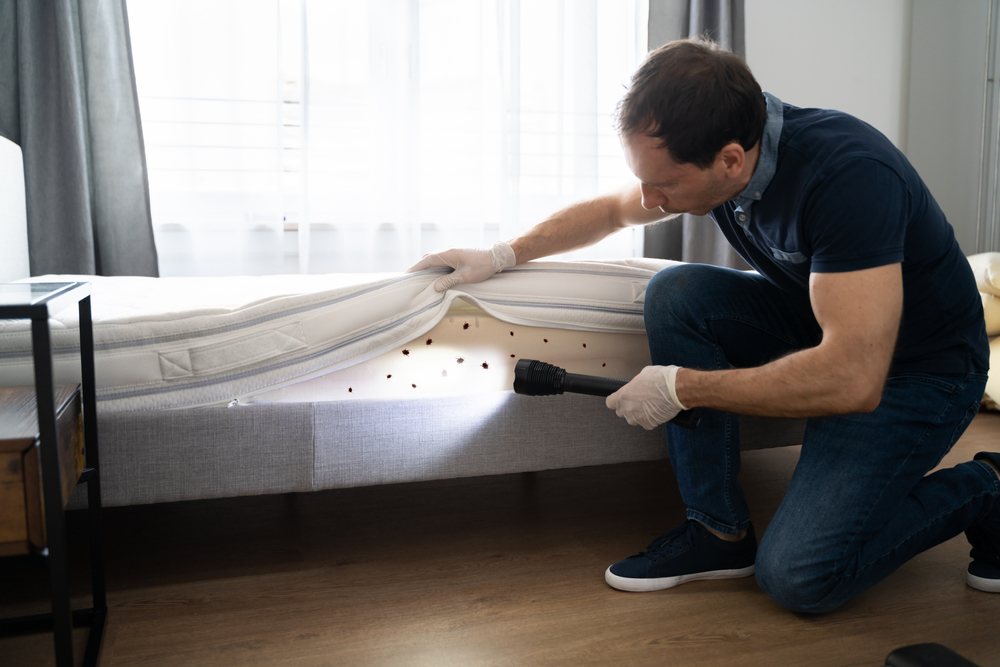
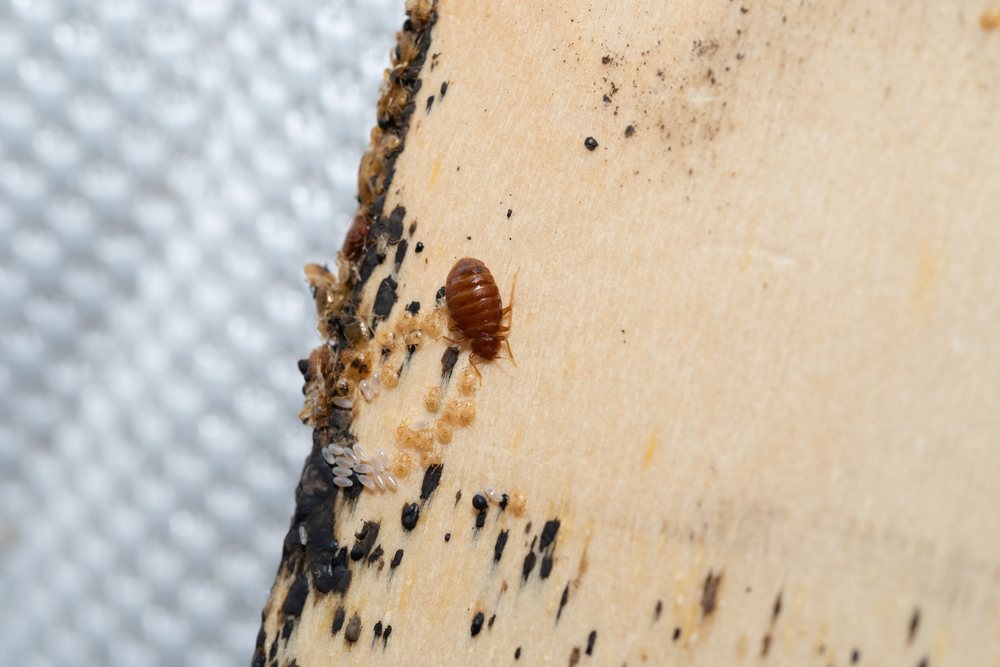



Anyone and everyone who has issues with bedbugs or is dealing with them should read this page. Your closing is spot-on: dealing with bed bugs should be considered case-by-case. There is no “one size fits all” for these infestations!